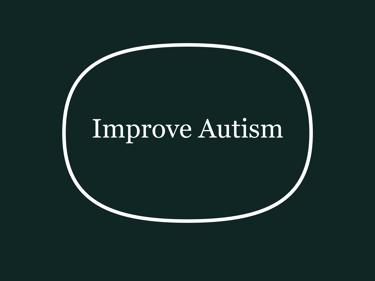Folinic Acid as Adjunctive Therapy in Treatment of Inappropriate Speech in Children with Autism: A Double-Blind and Placebo-Controlled Randomized Trial
Authors:
Batebi, N., Moghaddam, H.S., Hasanzadeh, A., Fakour, Y., Mohammadi, M.R. and Akhondzadeh, S.
Study Overview
This was a double-blind, placebo-controlled randomized trial conducted to evaluate the effects of folinic acid as an adjunctive therapy alongside risperidone in children with autism spectrum disorder (ASD). The study included:
Participants: 55 children with ASD, aged 4–12 years (mean age: 8.36 ± 1.81 years in the folinic acid group; 7.52 ± 1.84 years in the placebo group), with 35 males and 20 females.
Intervention:
Both groups received risperidone, a common medication for managing ASD behavioral symptoms.
Folinic Acid Group (n=28): Received folinic acid at a dose of 2 mg/kg up to 50 mg/day.
Placebo Group (n=27): Received a placebo alongside risperidone.
Duration: 10 weeks, with assessments at baseline, week 5, and week 10.
Outcome Measures:
Primary Outcome: Change in inappropriate speech, measured using the Aberrant Behavior Checklist-Community (ABC-C) inappropriate speech subscale.
Secondary Outcomes: Changes in stereotypic behavior, hyperactivity/noncompliance, lethargy/social withdrawal, and irritability, also assessed via ABC-C subscales.
Key Findings
Primary Outcome: Inappropriate Speech
Result: The folinic acid group showed a significantly greater reduction in inappropriate speech compared to the placebo group.
Mean Change (Baseline to Week 10):
Folinic Acid Group: 1.71 points (SE = 0.28).
Placebo Group: 0.88 points (SE = 0.28).
Statistical Significance: p = 0.045 (Cohen’s d = 2.98).
Time × Treatment Interaction: Significant (F = 3.51; df = 1.61; p = 0.044), indicating a greater improvement over time in the folinic acid group.
Secondary Outcomes
Stereotypic Behavior:
Mean Change (Baseline to Week 10):
Folinic Acid Group: 3.21 points (SE = 0.58).
Placebo Group: 1.59 points (SE = 0.45).
Statistical Significance: p = 0.034 (Cohen’s d = 3.12).
Time × Treatment Interaction: Significant (F = 4.02; df = 1.37; p = 0.036).
Hyperactivity/Noncompliance:
Mean Change (Baseline to Week 10):
Folinic Acid Group: 8.17 points (SE = 0.99).
Placebo Group: 3.96 points (SE = 0.95).
Statistical Significance: p = 0.003 (Cohen’s d = 4.33).
Time × Treatment Interaction: Significant (F = 6.79; df = 1.66; p = 0.003).
Lethargy/Social Withdrawal:
Mean Change (Baseline to Week 10):
Folinic Acid Group: 4.10 points (SE = 0.93).
Placebo Group: 3.25 points (SE = 0.67).
Statistical Significance: No significant difference (p = 0.466).
Time × Treatment Interaction: Not significant (F = 1.06; df = 1.57; p = 0.336).
Irritability:
Mean Change (Baseline to Week 10):
Folinic Acid Group: 10.67 points (SE = 0.83).
Placebo Group: 8.25 points (SE = 0.58).
Statistical Significance: p = 0.022 (Cohen’s d = 3.37).
Time × Treatment Interaction: Not significant (F = 2.86; df = 1.91; p = 0.064), though the folinic acid group showed a greater reduction in scores.
Safety and Tolerability
Adverse Events: No significant differences in the frequency or severity of side effects between the folinic acid and placebo groups.
Folinic Acid Group:
Most common: Increased appetite (25%), diarrhea (17.9%).
Placebo Group:
Most common: Headache (18.5%).
Other side effects (e.g., dizziness, sedation, abdominal pain) occurred at similar rates in both groups (p > 0.05 for all comparisons).
Conclusion: Folinic acid was well-tolerated, with no severe adverse events reported.
Interpretation and Conclusions
Efficacy: Folinic acid, when used as an adjunct to risperidone, significantly improved inappropriate speech, stereotypic behavior, and hyperactivity/noncompliance in children with ASD. It also reduced irritability, though the time × treatment interaction was not statistically significant. No significant effect was observed for lethargy/social withdrawal.
Safety: The addition of folinic acid did not increase the risk of adverse events compared to placebo, indicating good tolerability.
Clinical Implications: The study suggests that folinic acid could be a beneficial complementary supplement for managing specific behavioral symptoms in children with ASD, particularly inappropriate speech, stereotypic behavior, and hyperactivity/noncompliance.
Limitations:
Small sample size (n=55), limiting generalizability.
Short duration (10 weeks), insufficient to assess long-term effects.
Findings apply only to adjunctive therapy with risperidone, not folinic acid monotherapy.
Study summary
This trial provides preliminary evidence that folinic acid, at a dose of 2 mg/kg up to 50 mg/day, enhances the effects of risperidone in reducing inappropriate speech and certain behavioral symptoms in children with ASD over a 10-week period. While promising, the results warrant further investigation with larger samples and longer durations to confirm efficacy and evaluate long-term outcomes.
https://pubmed.ncbi.nlm.nih.gov/33029705/
doi: 10.1007/s10578-020-01072-8


